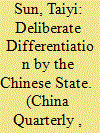| Srl | Item |
| 1 |
ID:
154821


|
|
|
|
|
| Summary/Abstract |
Through interviews and content analyses, this article conducted a comparative study of the drafting of China’s Internet Security Law (ISL) and E-Commerce Law (ECL). Although both had multiparty participants, they had very different substantive outcomes. Contrary to formalistic participation in the ISL, the ECL’s drafting involved considerable communication and negotiation. This difference was intended by the central party given its interests, and it was realized through its control over the scope, principle, direction and focus of the participation in the drafting, which is referred to as ‘leadership control’. This confirms the existence of consultative authoritarianism in China’s central lawmaking systems. The difference contributes to the theory by outlining indirect institutionalized control of the central party. This mode of control causes the authoritarian regime within the legal framework to occasionally be responsive and consultative, and at times fragmented, in realizing its interest in different situations. Such a polity still presents limits in terms of relieving contradictions in China. Power manipulation and attitudinal and fragmented problems can exaggerate such differences and result in the drafting of unreasonably polarized legislation. Interests and substantive power are essential for determining the limits and evolving directions of consultative authoritarianism. For further democratization, leadership control must be limited by the constitution and such limits must be afforded substantive power to become real and practical.
|
|
|
|
|
|
|
|
|
|
|
|
|
|
|
|
| 2 |
ID:
169790


|
|
|
|
|
| Summary/Abstract |
Do authoritarian governments’ responses towards different civil society organizations (CSOs) reflect policy differentiations? Building on the existing literature of graduated control, diversification of civil society, and consultative authoritarianism, this paper utilizes an online field experiment,1 and interviews with government officials and CSO leaders to demonstrate that local governments have the tendencies to intentionally treat different CSOs with different policy responses, referred to as “deliberate differentiation” in this paper. However, contrary to what the existing literature would suggest, this study reveals that at the local level, such differentiation is driven more by the state's interest in extracting productivity and outsourcing responsibility for the provision of public goods and less by the state's need to acquire information from CSOs, including politically sensitive advocacy groups.
|
|
|
|
|
|
|
|
|
|
|
|
|
|
|
|